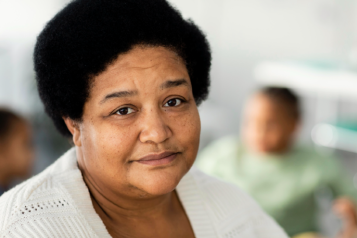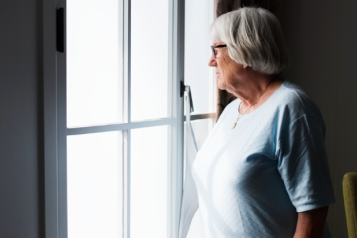Joined up health and social care services: Graham and Jean
Names have been changed to protect the identity of the people in this story.

Graham and Jean’s story: Constant communication failures
Graham and Jean from Gloucestershire are in their 70s and have been married 37 years. Having always been fairly fit and healthy, Jean enjoyed running and table tennis, but in May 2022 while in Spain, she suffered a major stroke. After two weeks in a Spanish hospital, Jean was flown home and spent five months in an acute ward.
Lack of communication
Of the issues that arose while Jean was in hospital, Graham believes most were due to poor communications and ambiguity surrounding who to speak to.
“I was often told to speak to the nurse looking after Jean, but that was difficult to establish and changed all the time. There were perhaps 18 different nurses, so I was never speaking to the same person. Knowing about the different roles was very difficult.”
Graham felt as though it was “unusual, as a relative, to ask questions, as if everyone else was quietly waiting for news.”
When Graham contacted Patient Advice and Liaison Service (PALS) for guidance, they advised to phone Jean’s ward each morning for updates, but when he tried this, he rang ten to 20 times with no answer.
“The upset of a stroke to loved ones is enormous, and they’re adding to that by making it impossible to find out what’s happening.”
At one point a nurse told Graham he wasn’t allowed to know about Jean’s medication, despite being her next of kin and advocate. On another occasion he was told to wear complete PPE and assumed this was due to Covid, however staff said, “It is because of your wife’s MRSA.”
“This was the first I‘d heard of it, they’d picked it up two or three days before and not informed me.”
On yet another visit, Graham noticed Jean’s toes were blue and alerted a nurse who said she would call a doctor, but he remained worried.
“I tried to call repeatedly but there was no answer, so I drove back and it turned out a doctor hadn’t been called. It is ridiculous, what if someone couldn’t go back?”
Things were even more difficult at weekends.
“There were far fewer doctors and there was far less personal care. For instance, Jean’s medications changed daily to find the best regime, but if a change was having a negative effect on Friday, nothing was altered until Monday.”
Perhaps the worst communication failure was when a doctor held a meeting about Jean’s prospects in front of her.
“She spoke about resuscitation and whether to continue feeding because things were so bad. It was very distressing, I was worried I was going to break down. My main worry was Jean seeing me upset and being worried. I would rather have a discussion in the corridor and risk being overheard, than talk about my wife in front of her.”
Differing medical opinions
A few days before Jean was to be discharged, her haemoglobin level dropped drastically, indicative of internal bleeding. An endoscopy identified stomach ulcers and Jean had a blood transfusion and stabilised. At first Graham was informed her anticoagulants would not be resumed as it would be dangerous, then a senior consultant advised they would be restarted in six weeks, before Graham was eventually told that alternative medications were being considered.
“Maybe you get different perspectives from consultants because of their personal views? You don’t have one doctor, so you move from one to another and get different answers. I want to understand their rationale.”
Graham also felt lost when it came to finding a care home for Jean.
“There are so many leaflets and documents, and an empire of people supposedly there to help, but you go round and round.”
The hospital’s Care Navigator told Graham it ‘wasn’t her job’ to help him, and simply provided a list of homes, many of which were unsuitable. What complicated matters was that the hospital declared Jean medically stable for discharge, but various care homes told Graham that her medical needs were still too complex.
“There were pressures on staff to free the bed, but they were still testing and revising Jean’s medications. Doctors’ definition of ‘medically stable’ seems inappropriate in relation to what a care home considers suitable.”
When an appropriate home was found, a transfer was scheduled and Graham waited for a couple of hours, before being told Jean had had another hypoglycaemic attack and couldn’t be transferred. He later discovered the attack had occurred overnight, but no one had alerted the doctors or informed Graham or the ambulance.
The last six months have exhausted Graham.
“Stroke has a huge impact on the loved ones, but no one asks how you are. I was always able to talk about things without emotion, but this got harder after Jean’s stroke.”
Graham spoke with a hospital chaplain who he was ‘outstandingly impressed’ by, and has since visited a psychologist, but things remain challenging.
“I thought I wouldn’t have to worry so much, but I’m still fighting all kinds of issues. She’s supposed to get community speech and language therapy and physio, but continuing care is difficult to access and the waiting times are so long.”
Did services provide good joined-up care?
What was good?
- NHS physiotherapy has been caring and motivational, helping Jean.
-
Graham has been able to receive emotional support, by seeking it out for himself.
What could be done differently to improve care for everyone?
- Clearer advice on the responsibilities/remits of medical teams and professionals.
- Better communication practices all round to keep relatives well-informed, ensure respect and dignity for all patients, and allow collaborative joined-up care.


